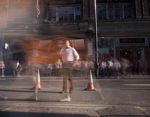I interviewed a number of scientists on a recent trip to Spain, and this is an extract from the first of those conversations. Dr Raul García has a background in medicine and neuroscience, and is a Children and Adolescents Psychiatrist in Madrid.
I started university as a civil engineering student, but I didn’t enjoy my studies. I was more interested in people than numbers and equations, and towards the end of my first year I was looking for something else to do. At the same time, I was involved in supporting a family friend who was suffering from mental illness, and I went with him to an appointment at the hospital where he was being treated. This person was a Christian, and during the interview he said that his future was in God’s hands. The medical staff laughed sceptically at him, interpreting his optimism as delusional thinking. This incident had a huge impact on me, and I began to think about studying medicine. I realised that I wanted to help people like my friend, and that this was both a scientific and a theological ambition. So I changed track, and studied medicine.
After I qualified as a psychiatrist I studied theology part-time. So now, alongside my clinical work and teaching I teach pastoral counselling and am part of the leadership team of a small church. In the history of psychiatry there are some well-known examples of psychiatrists who become philosophers or theologians. I think that the relationship between science and faith should be dialogic. Science has much to say to theology and theology has much to say to science, especially on the meaning of life and personal experience.
The challenge of neuroscientific advance is an anthropological question: what kind of human being is displayed in neuroscience? The brain is the cause of our thinking or feeling, but I think that there is another reality. We are not just our brains – we are also our experiences and choices, our motivations, longings, and desires. Christian theology says that God created us in his image and likeness. So we are intelligent and creative, able to express and receive love, and we have the capacity to take free moral decisions. A theological point of view is the most comprehensive one from which to interpret the human being, because it takes account of the transcendent.
What gives me a sense of wonder in my day-to-day work with children and their families is our developmental capacity. We have an amazing ability to adapt to an unfavourable environment and resist even the most negative situation. It is wonderful to see that, with a little help from me as a therapeutic agent, people have the capacity to ‘keep on keeping on’ in their daily life – they have resilience. Spiritually, they can transcend their difficulties, troubles and trials. Another source of wonder for me is the grace of God going in search of the ‘Prodigal Son’. In a certain sense we are all prodigal sons; God reaches out for us from difficult situations, even severe mental illness. And if someone has faith in God, he or she is in a better position to overcome their problems.
Maybe my year in engineering helped me to have a more objective point of view; but I haven’t really thought about it. I admire engineers very much because they build bridges and wonderful constructions, but I have always had a special interest in people: their mind, their behaviour, their conflicts, their gratefulness and their miseries. Studying medicine gave me the opportunity to understand the physical and psychological aspects of the human experience more deeply.
Raul García’s interest in the human person and how we function, for better or worse, is infectious. I wrote this while listening (not at exactly the same time) to Oxford philosopher Keith Ward’s lecture from the recent Faraday Institute ‘Science, Religion & Atheism’ course. Ward’s emphasis on experience and meaning is, I think, complementary to García’s approach.





